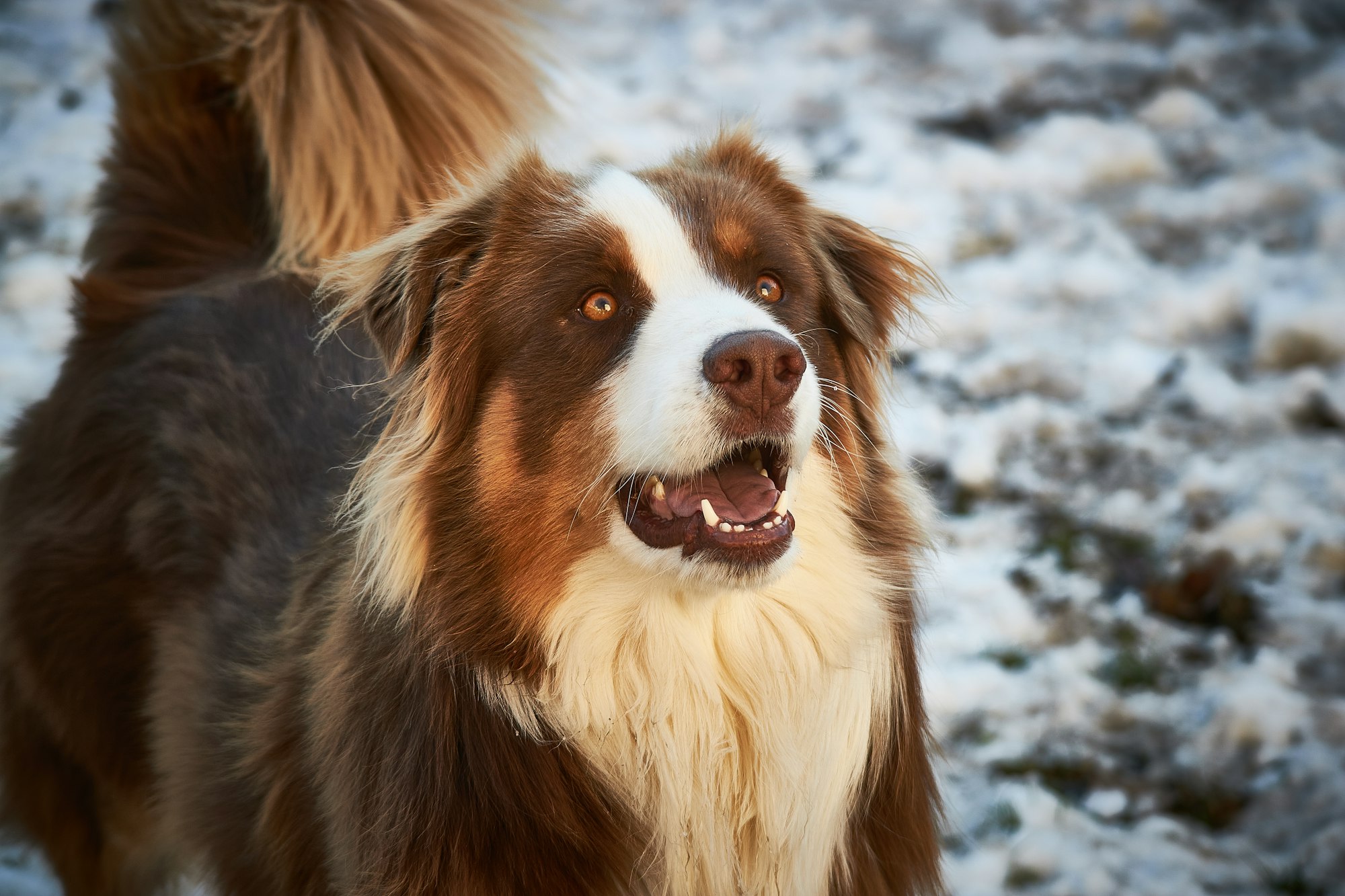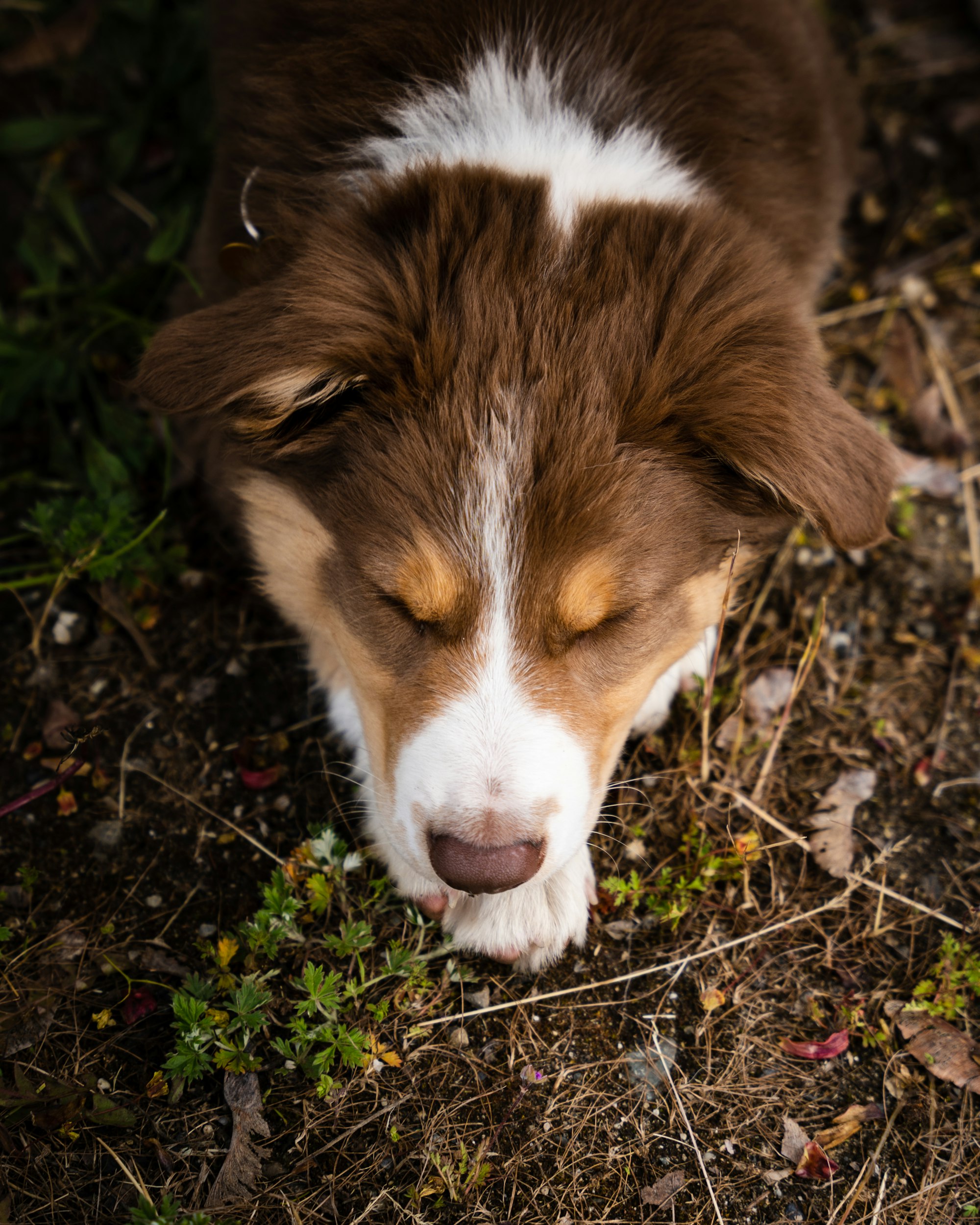The Brown Australian Shepherd is a captivating and highly intelligent dog breed that has gained popularity among happy dog enthusiasts. With their striking appearance, exceptional intelligence, and versatile skills, these dogs make wonderful companions and working partners. Here, we will explore the fascinating characteristics, temperament, training requirements, and health considerations of the Brown Australian Shepherd. Whether you're considering getting one as a pet or simply want to learn more about this remarkable breed, this article will provide you with valuable insights.

The Brown Australian Shepherd, also known as the Chocolate Australian Shepherd or Liver Australian Shepherd, originated in the United States. This breed was developed to assist shepherds in their herding duties. The Australian Shepherd, despite its name, did not originate in Australia. It is believed to have descended from various herding dogs imported to America in the 19th century.
Appearance and Coat
The Brown Australian Shepherd is a medium-sized dog with a well-balanced body structure. They have a beautiful double coat that protects them from various weather conditions. The coat color can range from deep chocolate brown to lighter shades of brown. Their expressive eyes and alert ears give them an intelligent and attentive expression.
Temperament and Personality
The Brown Australian Shepherd is known for its exceptional temperament and personality traits. These dogs are highly intelligent, loyal, and affectionate, making them wonderful companions. Here are some key aspects of their temperament and personality:
· Intelligence: Brown Australian Shepherds are incredibly intelligent dogs. They have a keen ability to learn and excel in various training activities. Their intelligence makes them highly adaptable and quick to pick up new commands and skills.
· Loyalty: These dogs are fiercely loyal to their owners and form strong bonds with their families. They are known to be protective and will go to great lengths to keep their loved ones safe. Their loyalty makes them excellent watchdogs and trusted companions.
· Affectionate: Brown Australian Shepherds are loving and affectionate by nature. They thrive on human interaction and enjoy being a part of family activities. They are always ready for a snuggle or a game of fetch and are happiest when they are by your side.
· Alertness: With their attentive nature, Brown Australian Shepherds are highly alert and make excellent watchdogs. They have a natural instinct to be aware of their surroundings and will alert their owners to any potential threats or unfamiliar situations.
· Playfulness: These dogs have a playful and energetic side that adds joy and entertainment to the household. They love interactive play sessions and enjoy games that challenge their intelligence and physical abilities. Their playful nature makes them great companions for active individuals or families.
Training and Exercise Needs
Brown Australian Shepherds have high energy levels and require regular mental and physical stimulation. Here's what you need to know about their training and exercise needs:

· Training: Due to their intelligence and eagerness to please, Brown Australian Shepherds are highly trainable. They thrive on positive reinforcement techniques and respond well to rewards-based training methods. Early socialization and obedience training are crucial to ensure they grow into well-behaved and well-rounded dogs.
· Exercise: These dogs have an innate drive to be active and engaged. They need plenty of exercise to keep both their bodies and minds stimulated. Daily walks, runs, or play sessions in a securely fenced area are essential to meet their exercise requirements. Engaging them in activities such as agility training or advanced obedience can also help productively channel their energy.
· Mental Stimulation: Brown Australian Shepherds crave mental challenges as much as physical exercise. They excel in activities that require problem-solving and learning new skills. Providing them with puzzle toys, interactive games, and training sessions that focus on mental stimulation will help prevent boredom and promote their overall well-being.
Socialization and Interaction
Proper socialization is vital for Brown Australian Shepherds to develop into well-adjusted and confident dogs. Here are some essential points about socialization and interaction:
· Early Socialization: Introduce your Brown Australian Shepherd to a wide range of people, animals, and environments from a young age. Expose them to different sights, sounds, and experiences to help them become comfortable and confident in various situations. This will contribute to their ability to interact positively with people and other animals throughout their lives.
· Positive Experiences: Ensure that your Brown Australian Shepherd has positive interactions with people and animals. Encourage gentle and controlled introductions, reward calm and friendly behavior, and provide ample praise and treats. Positive experiences will help them develop good social skills and reduce the likelihood of fear or aggression issues.
· Continued Socialization: Socialization should be an ongoing process throughout your dog's life. Regularly expose them to new environments, people, and animals. Joining training classes or dog clubs can provide opportunities for controlled socialization and help reinforce their social skills.
· Supervised Interactions: When introducing your Brown Australian Shepherd to new dogs or animals, always supervise the interactions to ensure safety and prevent any potential conflicts. Provide positive reinforcement and step in if any signs of aggression or discomfort arise.
Health and Care
When it comes to the health and care of your Brown Australian Shepherd, there are several factors to consider. Here's what you need to know:

· Regular Veterinary Check-ups: Schedule regular check-ups with a trusted veterinarian to monitor your dog's overall health and catch any potential issues early. Vaccinations, parasite prevention, dental care, and routine examinations are essential for maintaining their well-being.
· Health Conditions: While Brown Australian Shepherds are generally healthy dogs, like any breed, they can be prone to specific health conditions. Some common health concerns include hip dysplasia, elbow dysplasia, progressive retinal atrophy, epilepsy, and certain genetic disorders. Choose a reputable breeder who conducts health screenings on their breeding dogs to minimize the risk of inherited diseases.
· Exercise and Weight Management: Regular exercise is necessary for maintaining your Brown Australian Shepherd's physical and mental health. Ensure they receive adequate exercise to prevent obesity and promote cardiovascular fitness. Monitor their weight and adjust their diet and exercise routine accordingly.
· Dental Care: Good dental hygiene is crucial for your dog's overall health. Brush their teeth regularly with a dog-specific toothbrush and toothpaste. Additionally, provide dental chews or toys that help reduce tartar buildup and keep their gums healthy.
Nutrition and Feeding
Feeding your Brown Australian Shepherd a balanced and nutritious diet is essential for their well-being. Here are some tips for their nutrition and feeding:
· High-Quality Dog Food: Choose a high-quality dog food that is appropriate for your Brown Australian Shepherd's age, size, and activity level. Look for dog foods that list quality protein sources, whole grains, fruits, and vegetables as primary ingredients. Avoid foods with artificial additives or fillers.
· Feeding Schedule: Establish a regular feeding schedule for your dog and stick to it. Divide their daily recommended portion into two or three meals to avoid overfeeding and promote digestion. Follow the guidelines provided by the dog food manufacturer, but adjust the portion sizes based on your dog's individual needs and activity level.
· Monitor Weight: Keep an eye on your dog's weight to ensure they maintain a healthy body condition. Obesity can lead to various health problems, so consult with your veterinarian to determine the ideal weight range for your Brown Australian Shepherd and adjust their diet and exercise accordingly.
· Hydration: Always provide fresh and clean water for your dog. Ensure they have access to water throughout the day, especially after exercise or during hot weather.
Brown Australian Shepherds Grooming Tips
Proper grooming helps keep your Brown Australian Shepherd's coat healthy and promotes overall cleanliness. Here are some grooming tips to keep in mind:
· Brushing: Brown Australian Shepherds have a medium-length double coat that requires regular brushing to prevent matting and remove loose fur. Use a slicker brush or a grooming tool specifically designed for their coat type. Aim to brush their coat at least two to three times a week, or more frequently during shedding seasons.
· Bathing: Bathe your Brown Australian Shepherd as needed, using a dog-specific shampoo that is gentle on their skin and coat. Be mindful not to over-bathe them, as excessive bathing can strip their coat of natural oils. Regular brushing helps keep their coat clean between baths.
· Nail Care: Trim your dog's nails regularly to prevent overgrowth, which can be uncomfortable or lead to issues with walking. Use dog nail clippers or seek assistance from a professional groomer if you're not confident in doing it yourself.
· Ear Cleaning: Check and clean your Brown Australian Shepherd's ears regularly to prevent ear infections. Use a dog ear cleaning solution and gently wipe the outer part of their ears with a cotton ball or a soft cloth.
· Teeth Cleaning: Dental hygiene is required for your dog's overall health. Brush their teeth regularly using a dog-specific toothbrush and toothpaste. Dental chews or toys can also help promote good oral hygiene.
Finding a Reputable Breeder
When looking for a Brown Australian Shepherd, it is crucial to find a reputable breeder who prioritizes the health and well-being of their dogs. Here are some tips to help you find a trustworthy breeder:
· Research: Start by researching local breeders who specialize in Brown Australian Shepherds. Look for breeders who have a good reputation and positive reviews from previous customers. Online platforms, breed-specific websites, and local dog clubs can be valuable sources of information.
· Visit the Breeder: Once you have identified potential breeders, arrange a visit to their facilities. This allows you to see firsthand how the breeder raises and cares for their dogs. Pay attention to the cleanliness of the environment, the health and condition of the dogs, and the breeder's knowledge and passion for the breed.
· Health Testing: A reputable breeder conducts health tests on their breeding dogs to minimize the risk of passing on inherited diseases. Inquire about the health testing that has been performed on the parents of the puppies. This may include tests for hip dysplasia, eye disorders, and other common health issues in the breed.
· Socialization and Care: Responsible breeders ensure that their puppies receive proper socialization and care from an early age. Ask about the socialization practices the breeder employs to expose the puppies to various stimuli and experiences. Well-socialized puppies are more likely to develop into confident and well-rounded adults.
· Ask Questions: Don't hesitate to ask the breeder questions about their breeding program, the temperament and characteristics of the breed, and any concerns you may have. A reputable breeder will be open and transparent in their communication and will gladly provide you with the information you need to make an informed decision.
Introducing a Brown Australian Shepherd to Your Family
Bringing a Brown Australian Shepherd into your family requires careful consideration and preparation. Here are some necessary steps to ensure a smooth transition and successful integration:
· Family Discussion: Start by discussing with all family members the responsibilities and commitment involved in owning a dog. Ensure that everyone is on board and willing to contribute to the care and well-being of the Brown Australian Shepherd.
· Preparing Your Home: Create a safe and welcoming environment for your new companion. Puppy-proof your home by removing any potential hazards, such as toxic plants, small objects, or electrical cords. Set up a comfortable bed, provide appropriate toys, and establish a designated area for feeding and toileting.
· Establish Routines: Dogs thrive on routine, so establish consistent schedules for feeding, exercise, and potty breaks. This helps your Brown Australian Shepherd understand expectations and promotes good behavior.
· Training and Socialization: Early training and socialization are crucial for a well-behaved and well-adjusted dog. Enroll your Brown Australian Shepherd in puppy training classes or seek the guidance of a professional dog trainer. Introduce them to various environments, people, and other animals to promote positive social interactions.
· Patience and Bonding: It takes time for your Brown Australian Shepherd to adjust to their new home and form a bond with your family. Be patient and understanding during the initial adjustment period. Spend quality time with them, engage in play sessions, and provide positive reinforcement for desired behaviors.
· Healthcare and Nutrition: Schedule an appointment with a veterinarian to ensure your Brown Australian Shepherd receives a thorough health check-up and vaccinations. Discuss the appropriate diet and feeding schedule for your dog's age, size, and activity level.
Conclusion
The Brown Australian Shepherd is a captivating and intelligent dog breed that brings joy and companionship to its owners. With their striking appearance, exceptional intelligence, and versatile skills, these good family dogs are highly sought after. By understanding their needs, providing proper care, and engaging them in activities, you can cultivate a strong and fulfilling bond with your Brown Australian Shepherd. Remember to always choose a reputable breeder and prioritize their health and well-being. So, if you're looking for a loving and loyal companion who will enrich your life, consider welcoming a Brown Australian Shepherd into your family.
Frequently Asked Questions (FAQs)
Q1. Are Brown Australian Shepherds good with children?
Yes, Brown Australian Shepherds are generally good with children. They are affectionate and protective, making them great companions for kids. However, as with any dog breed, supervision, and teaching children how to interact with dogs respectfully are essential.
Q2. How much exercise do Brown Australian Shepherds need?
Brown Australian Shepherds are energetic dogs that require a significant amount of exercise. Aim for at least 60 minutes of physical activity per day, which can be a combination of walks, playtime, and mental stimulation.
Q3. Do Brown Australian Shepherds shed a lot?
Brown Australian Shepherds have a moderate shedding level. Regular grooming and brushing can help manage their shedding and keep their coat healthy and free from mats.
Q4. Can Brown Australian Shepherds live in apartments?
While Brown Australian Shepherds can adapt to apartment living, they require ample exercise and mental stimulation. Living in a smaller space may necessitate more frequent walks and activities to meet their needs.
Q5. Do Brown Australian Shepherds get along with other pets?
With proper socialization, Brown Australian Shepherds can get along well with other pets. Early introductions, positive reinforcement, and supervised interactions are key to ensuring harmony among different animals in the household.

